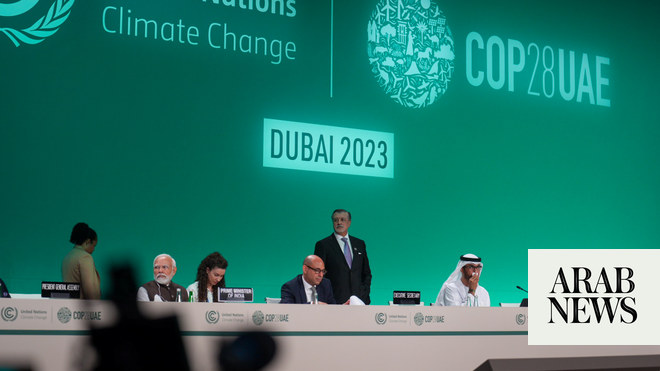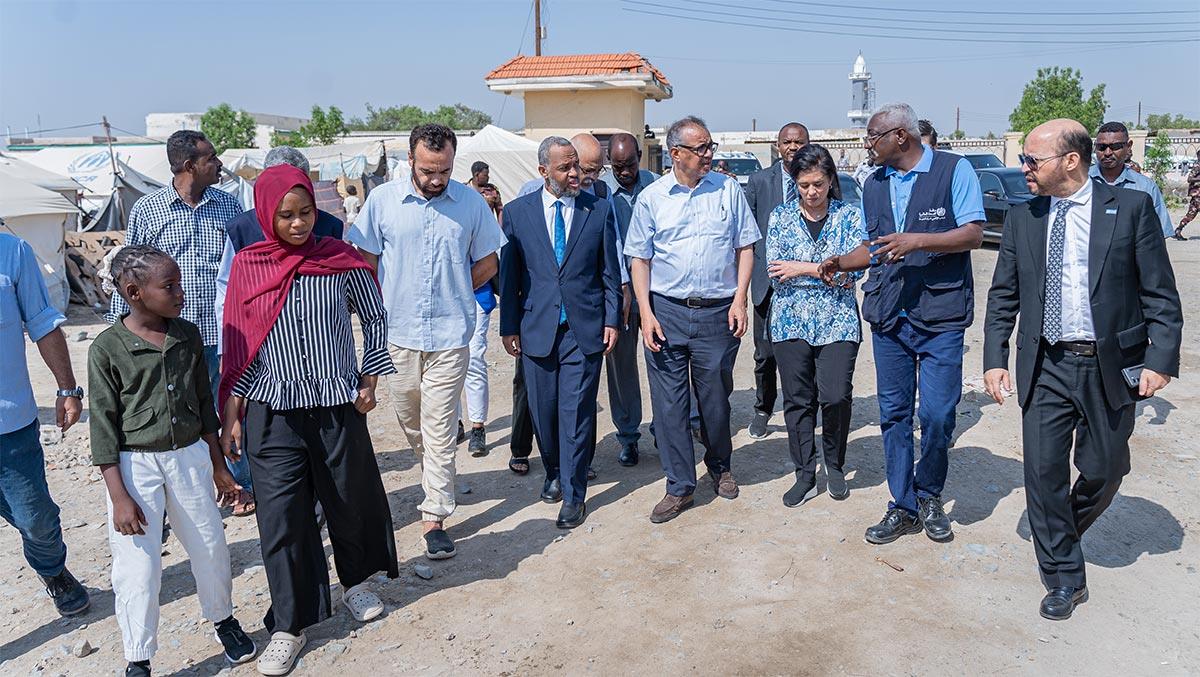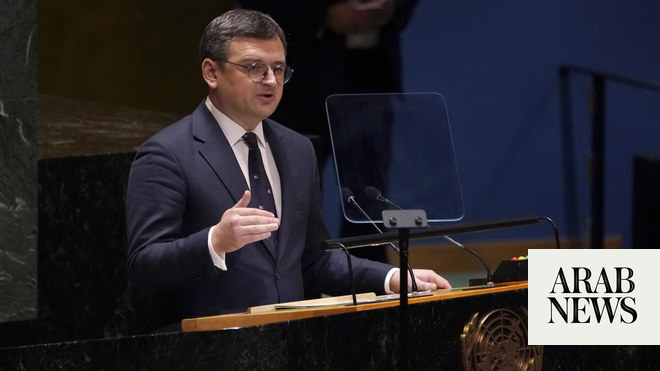
Kuwait aims to achieve net zero emissions by 2060, supported by strategic initiatives and a significant shift toward renewable energy
World leaders are expected to announce further initiatives to address climate threats through collaborative, international approaches
RIYADH: World leaders entered their third day of climate talks at COP29 in Baku, marking a critical juncture in discussions focused on climate action and multilateral cooperation.
The High-Level Segment continued with addresses from heads of state and government as countries reiterated commitments to combat climate change.
As COP29 progresses, world leaders are expected to announce further initiatives to address climate threats through collaborative, international approaches.
Here is a summary of events in Baku.
11:35 a.m. – Russia and US among countries to reaffirm climate action
Russian Prime Minister Mikhail Mishustin used his speech to reiterate his country’s climate efforts, noting: “Russia remains committed to low carbon development,” and pledged ongoing collaboration on international climate goals.
John Podesta, representing the US, asked: “Do we secure sustainable prosperity for our countries, or do we condemn our most vulnerable to unimaginable climate disasters?”
Daniel Risch, Prime Minister of Liechtenstein, highlighted the global commitment, noting: “The presence of so many states from around the world is a powerful sign that the fight against climate change is a key challenge of our time.”
He stressed the need for “bold steps” against the security, economic, and social issues exacerbated by climate change and reaffirmed Liechtenstein’s dedication to its commitments.
Morocco’s Prime Minister, Aziz Akhannouch, underscored his country’s role in the energy transition, stating: “Morocco has for many years played a major role in the energy transition at the international, national and continental levels.”
He announced plans to raise decarbonization targets in Morocco’s NDCs and warned: “Natural disasters due to global warming are causing considerable economic and human loss, and affecting food security, healthcare facilities, and access to safe water.”
Prime Minister Russell Dlamini of Eswatini pointed out the worsening climate impacts, referencing the World Meteorological Organization’s warning of an “80 percent chance that global temperatures will exceed 1.5 degrees Celsius above pre-industrial levels within the next five years.”
Similarly, Prime Minister Mark Brown of the Cook Islands said: “The world is warming, and the transition away from fossil fuels is non-negotiable.”
Prime Minister Judith Suminwa of the Democratic Republic of the Congo said: “We are gathered here today at COP29 at a time when our planet is dealing with an unprecedented climate emergency.”
11:05 a.m. – Our speeches change nothing, Albanian PM tells COP29
Albanian Prime Minister Edi Rama delivered a sharp critique at COP29, calling on participating countries that are speaking without action, while underscoring the disconnect between rhetoric and reality in the global fight against climate change.
“Life goes on with its old habits, and our speeches full of good words about fighting climate change change nothing,” said Rama.
He pointed out that despite the ambitious goals set in previous climate summits, global carbon emissions have actually increased on an annual basis, reflecting a lack of genuine progress.
Rama highlighted Albania’s commitment to sustainability, noting its 100 percent renewable energy production. However, he questioned the impact of smaller nations’ efforts in the face of continued inaction by the world’s biggest polluters.
“I come here from a little country in the middle of Europe, Albania, where we have 100 percent renewable energy production. But what does it mean for the future of the world if the biggest polluters continue business as usual?” he asked, emphasizing the need for coordinated global action.
In a candid assessment, Rama expressed frustration at the repetitive nature of international climate conferences, which he argued have failed to produce concrete results.
“Far be it from me to lecture anyone, after all, we are used to being lectured, not to lecturing others,” he said. “But my point is, what on earth are we doing in these gatherings over and over if there is no common political will on the horizon to go beyond words and unite for meaningful action?”
Rama also criticized the absence of key players from the event, suggesting that the decision of major and minor countries to boycott the summit undermines its credibility and raises questions about the seriousness of global commitments.
“Adding insult to injury, major and minor players even boycotted this ample global event,” he said.
10:40 a.m. – Calls for increased nuclear power growing
Nuclear power is essential to achieving global climate goals as it provides a clean and safe energy source, world leaders stated at COP29 in Baku.
The Czech Republic’s Prime Minister Petr Fiala emphasized the importance of nuclear power for the future, adding that his country is prepared to assist other nations in advancing this form of energy.
“We will discontinue coal, and we will push for renewables and nuclear power. Nuclear power is essential to meet our climate goals, as it produces extremely clean energy and is also very safe. The Czech Republic has over 50 years of experience in nuclear power, and we are ready to assist any country,” said Fiala.
His comments were echoed by the Italian Prime Minister Giorgia Meloni.
10:00 a.m. – All energy sources should be used to cope with population rise – Italian PM
In her address to COP29, Italian Prime Minister Giorgia Meloni warned that population growth will increase energy demand.
“We need an energy mix in the transition process. We must use all energy sources, biogas, gas and even nuclear fusion in the future,” she said.
Meloni believes that technology neutrality is the right approach, and currently, there is no single alternative to fossil fuel supply.
9:46 a.m. – Day 3 begins with more world leaders addressing the conference
Kuwait’s Crown Prince Sheikh Sabah Khaled Al-Hamad Al-Sabah emphasized his country’s long-term strategy for environmental sustainability and carbon reduction, stating that climate change “is a global concern and a threat to many countries.”
Highlighting the visible impacts of climate change, he cited “rising temperatures, dust storms, and heavy rain” as growing challenges in the region.
Kuwait aims to achieve net zero emissions by 2060, supported by strategic initiatives and a significant shift toward renewable energy. The country plans to generate 50 percent of its electricity from solar power, a major component of its national sustainability efforts, Al-Sabah said.
The session opened with Shina Ansari, Iran’s vice president, followed by Joseph Owondault Berre, Gabon’s vice president. Berre underscored the importance of multilateralism, calling it “the only weapon that can tackle issues associated with climate change.”
He emphasized the need for “collective action based on trust, fairness, and shared responsibility,” highlighting that global collaboration remains critical in addressing climate impacts equitably.












